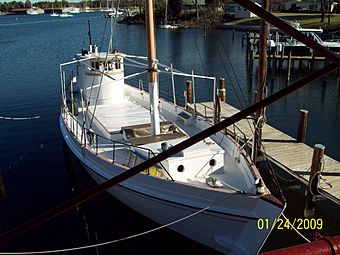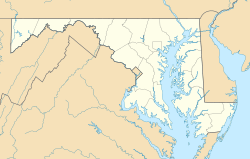William B. Tennison (bugeye) facts for kids
|
William B. Tennison (Chesapeake Bay Bugeye)
|
|

William B. Tennison Solomons, Maryland, December 2008
|
|
| Location | Solomons, Maryland |
|---|---|
| Built | 1899 |
| Architect | B.P. Miles, Frank Laird |
| NRHP reference No. | 80001799 |
Quick facts for kids Significant dates |
|
| Added to NRHP | March 27, 1980 |
| Designated NHL | April 19, 1994 |
The William B. Tennison is a special boat from the Chesapeake Bay. It was built way back in 1899. This boat started as a "bugeye," which is a type of sailing ship. Later, around 1906-1907, it was changed into an "oyster buy-boat." This meant its sails were taken off and an engine was put in.
The Tennison is the only boat left that shows this kind of change. Its building style also shows a shift from using whole logs to using planks of wood. Today, the boat lives at the Calvert Marine Museum in Solomons, Maryland. Some people say the Tennison is the second oldest passenger boat in the United States that is still allowed to carry people.
This historic boat was added to the National Register of Historic Places in 1980. It was then named a National Historic Landmark in 1994. This means it's very important to the history of the country.
What the William B. Tennison Looks Like
The William B. Tennison was first built as a sailing bugeye. It was made from nine large pieces of pitch pine logs. These logs were about 9 inches (23 cm) thick at the bottom. They got a bit thinner, about 6 inches (15 cm), at the sides.
The boat is about 60.5 feet (18.4 m) long on its deck. It is 17.5 feet (5.3 m) wide and goes 4.5 feet (1.4 m) deep into the water. The bottom of the boat is flat, and its sides are rounded. Both the front and back ends are pointed. Above the logs, the boat has oak frames and planks. These parts make the sides taller.
Inside, a wall separates the front area, called the foc'sle, from the main storage area, called the hold. When the boat got its engine, another wall was added. This wall separated the hold from the engine room. Also, a part called the centerboard trunk was removed. A "patent stern" was added to make the back of the deck flat. This gave more space for working. A piece of the rudder was cut away to make room for the propeller.
When the Tennison was changed into a buy-boat, its main mast and some ropes were removed. These parts were needed for sailing. The front mast was kept, though. It was used to lift baskets of oysters from other boats into the Tennison's hold. It used two special poles called gaff-rigged booms.
A small room for the captain, called a pilothouse, was also added. It has a rounded front, which was common for these boats. There are three windows at the front. Each side has one window and a door. The pilothouse is covered with cypress wood. Inside, there are two beds on the left side at the back. There is also a small bathroom. A hatch in the floor lets you get to the engine. The front part of the boat, the foc'sle, used to have three beds, a table, and a stove for cooking.
The History of the William B. Tennison
The William B. Tennison was built in 1899 by Frank Laird. He built it at Crabb Island, near Oriole, Maryland. This was a bit late for a bugeye. At that time, smaller, cheaper boats called skipjacks were becoming more popular.
Benjamin P. and Rufus L. Miles first used the Tennison to dredge for oysters. This means they used it to scoop oysters from the seabed. Around 1908-1909, the boat was changed to use an engine. In 1910, the Tennison was sold to Alphonse Lafayette Hazelwood. He used it to carry farm products around Norfolk, Virginia and the Albemarle Sound area until 1930. During oyster season, it worked as a buy-boat. Its first engine, which had 37 horsepower, was replaced with a stronger 60-horsepower one.
In 1933, the boat was sold to Barney B. Winnal for $2050. Later, it was sold to O.A. Bloxom's company. Then, in 1944, J.C Lore and Sons of Solomons, Maryland bought it. The Lores used the Tennison to dredge oysters on their own oyster beds. They also used it as a buy-boat.
The Tennison was partly rebuilt in 1952 at a place called H. Krentz Railway. The pilothouse was fixed up at this time. In 1952, a big storm called Hurricane Hazel pushed the boat onto the shore. People say you can still see the mark from where it was dragged back into the water. In 1955, a new, powerful 155-horsepower diesel engine was put in. This engine might have come from a naval landing craft. In 1977, the boat was changed to carry passengers. Almost all of its main support frames were replaced then.
No one knows for sure who William B. Tennison, the boat's namesake, was.



